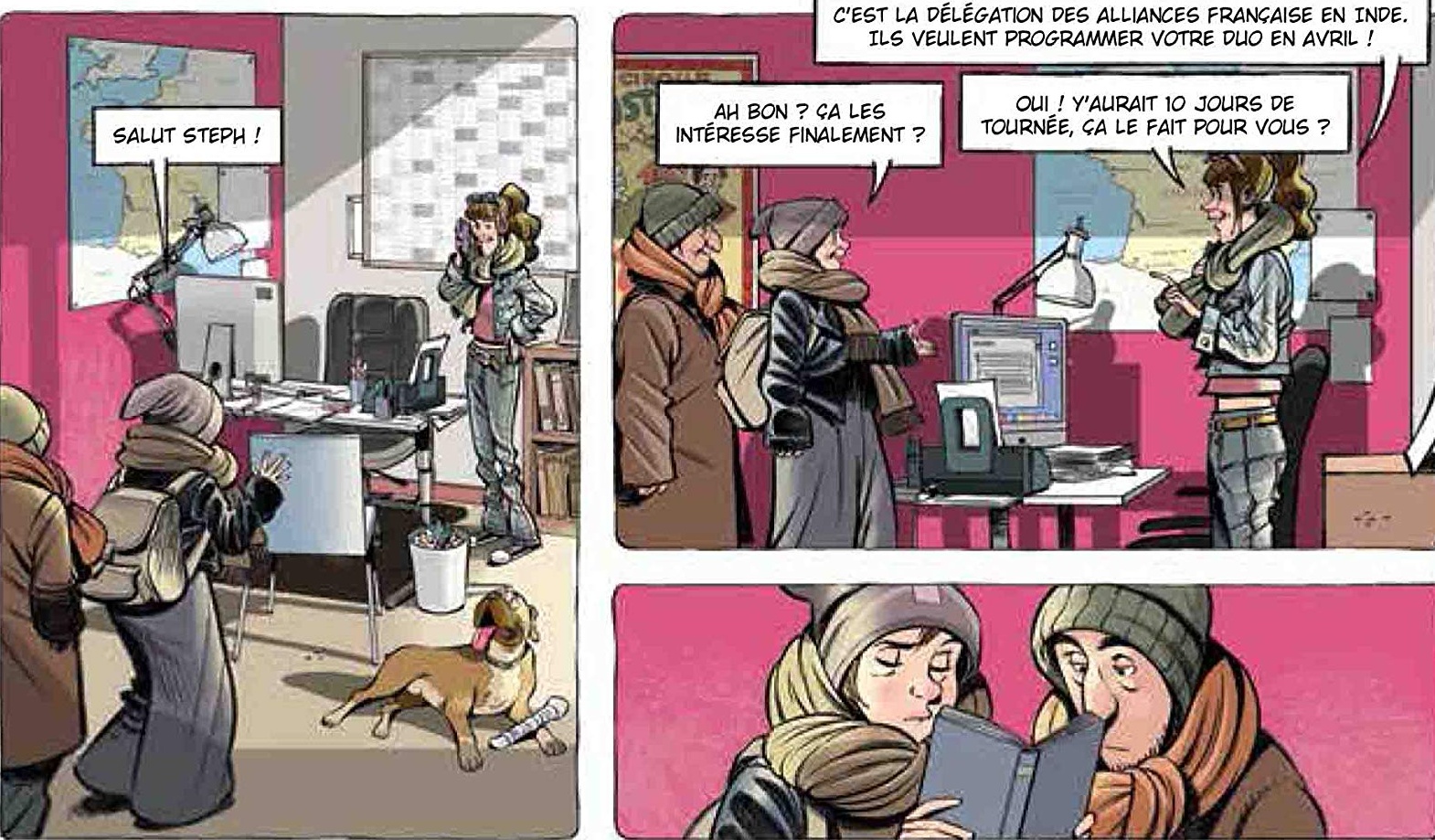The intermittents of the show are perfect scapegoats of editorialists who never cease to complain about their status. Edited by Delcourt, Le zizi de l'ange dismantles all these stereotypes by showing with humor the preparation of a show.
Between two shows
 In the pre-covid world, spectators come out delighted with a circus show and exchange their impressions through deep reflections. Delighted with this success, the troupe has just completed its 300th performance and has the ardent desire to embark on a new show. After consulting their calendar, they give themselves a year to prepare it. The screenwriter Marion Achard chronicles this period in Le zizi de l'ange and the reader permanently changes his mind about the performing arts. No, artists are not hurluberlus living in a cloud of creation. The troupe starts by managing their schedule to free up preparation time between the last performances, the residencies. Everything is complicated by a proposal, certainly unavoidable, but distant. No, acrobats do not feed on wind. The troop, helped by an agent, must find funding and sometimes it is necessary to spend without being sure of receiving the money. The worst, but also the funniest for the reader, is a Kafkaesque request from Pôle emploi. To maintain her status, a magician must prove ties of subordination even though she works in a leaderless troupe. Depressed, she is sick with each rehearsal. Already author of Tamba poignant testimony on a child soldier, Marion Achard proves once again her talent for mixing facts and invention… in a much funnier register here. From the first pages of the zizi de l'ange, the experience of the screenwriter, who has been in a circus, is reflected in the bubbles. She was able to pass on this experience to the cartoonist Miguel Francisco. By the talent of this duo, the reader then finds himself in the middle of the troop in the middle of a training session.
In the pre-covid world, spectators come out delighted with a circus show and exchange their impressions through deep reflections. Delighted with this success, the troupe has just completed its 300th performance and has the ardent desire to embark on a new show. After consulting their calendar, they give themselves a year to prepare it. The screenwriter Marion Achard chronicles this period in Le zizi de l'ange and the reader permanently changes his mind about the performing arts. No, artists are not hurluberlus living in a cloud of creation. The troupe starts by managing their schedule to free up preparation time between the last performances, the residencies. Everything is complicated by a proposal, certainly unavoidable, but distant. No, acrobats do not feed on wind. The troop, helped by an agent, must find funding and sometimes it is necessary to spend without being sure of receiving the money. The worst, but also the funniest for the reader, is a Kafkaesque request from Pôle emploi. To maintain her status, a magician must prove ties of subordination even though she works in a leaderless troupe. Depressed, she is sick with each rehearsal. Already author of Tamba poignant testimony on a child soldier, Marion Achard proves once again her talent for mixing facts and invention… in a much funnier register here. From the first pages of the zizi de l'ange, the experience of the screenwriter, who has been in a circus, is reflected in the bubbles. She was able to pass on this experience to the cartoonist Miguel Francisco. By the talent of this duo, the reader then finds himself in the middle of the troop in the middle of a training session.
The constraints of the group
 The narrator is a magician living in a relationship with an acrobat. But if they share the same passion for circus, these two artists are very different. She is as organized and pessimistic as he is optimistic and needs to improvise in freedom. These oppositions cross the troop and create tension from the beginning. The main narrator – probably close to the author's experience – wants a collective work but everyone remains in his bubble and she feels excluded. Demanding a round sound, the musician has incomprehensible demands for circus artists. Inspiration can be triggered in a bathroom when a shaving foam becomes the trigger for a scene. The magician is certainly the most jaded of the group but also the most lucid because she feels that the group is sinking while the others are just happy to experiment. The stress mounts for the artists but also for the reader as the date of the first show approaches. Will they be ready? The troupe will look for the solution in an outside look. This woman will know how to create a bond and listen to them pour out their anxieties but she will not be able to go to the end of the adventure.
The narrator is a magician living in a relationship with an acrobat. But if they share the same passion for circus, these two artists are very different. She is as organized and pessimistic as he is optimistic and needs to improvise in freedom. These oppositions cross the troop and create tension from the beginning. The main narrator – probably close to the author's experience – wants a collective work but everyone remains in his bubble and she feels excluded. Demanding a round sound, the musician has incomprehensible demands for circus artists. Inspiration can be triggered in a bathroom when a shaving foam becomes the trigger for a scene. The magician is certainly the most jaded of the group but also the most lucid because she feels that the group is sinking while the others are just happy to experiment. The stress mounts for the artists but also for the reader as the date of the first show approaches. Will they be ready? The troupe will look for the solution in an outside look. This woman will know how to create a bond and listen to them pour out their anxieties but she will not be able to go to the end of the adventure.
Between meals
If Le zizi de l'ange follows the work of artists, we often return to reality through their daily and family life. What to do when there is nothing left to eat in the fridge? How to find the time to create when you also have to take care of the children? Strangely, the youngest are the most conventional. The youngest son hopes that one day his mother will have a real job. The eldest teenage daughter is still surprised by the eccentricity of her darons but regrets never seeing them. All these difficulties are written with humor even the most unfair as the difficulty of being pregnant when one is intermittent. In Le zizi de l'ange, the reader discovers what we never see but there is nothing sexual about it. Through Marion Achard's talent as a storyteller, the reader discovers the backstage of a creation. The cartoonist Miguel Francisco opens this private space between two shows. Spectators think that artists do nothing… But the reader now understands the stress caused by this intense period. If you like crossovers between the arts, we advise you to read the chronicles on Finding Ganesh and Les amants d'Hérouville.




























![Sum’One sort la pépite électro Let It Snow et le EP Hello Vera Sum'One - Let It Snow [Official Video]](https://www.justfocus.fr/wp-content/uploads/2024/11/SumOne.jpg)











